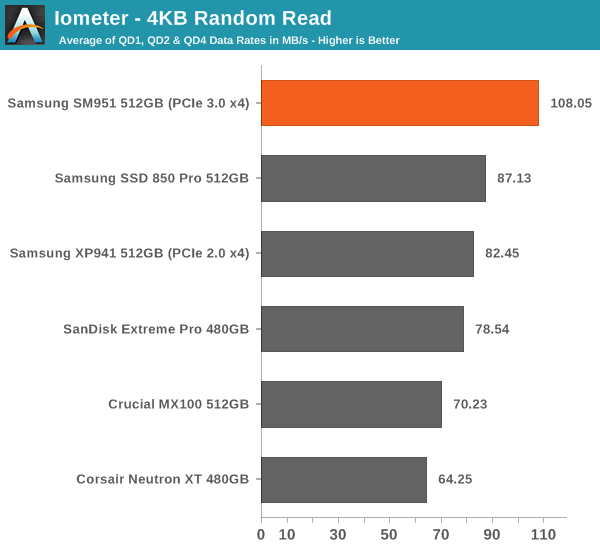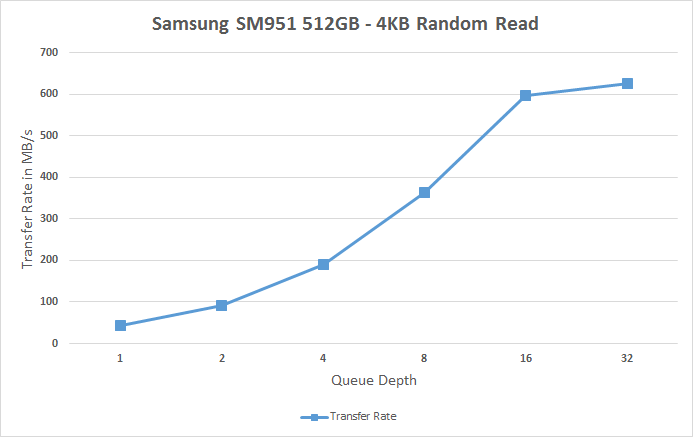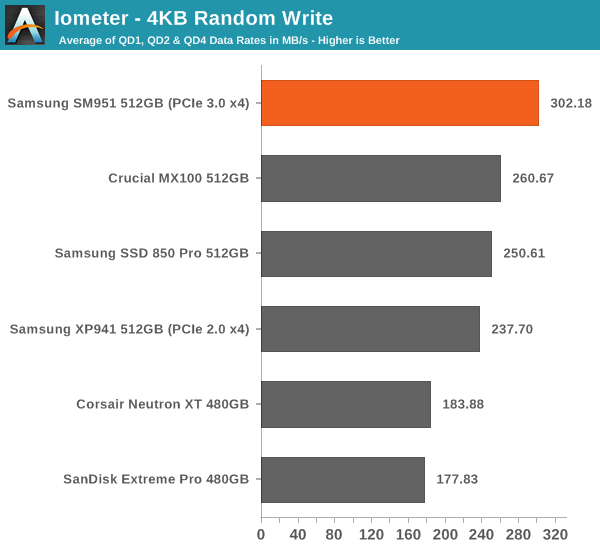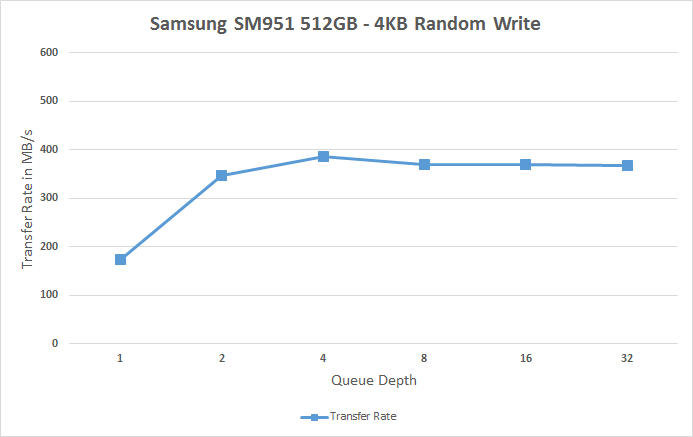Samsung SM951 (512GB) PCIe SSD Review
by Kristian Vättö on February 24, 2015 8:00 AM ESTRandom Read Performance
One of the major changes in our 2015 test suite is the synthetic Iometer tests we run. In the past we used to test just one or two queue depths, but real world workloads always contain a mix of different queue depths as shown by our Storage Bench traces. To get the full scope in performance, I'm now testing various queue depths starting from one and going all the way to up to 32. I'm not testing every single queue depth, but merely how the throughput scales with the queue depth. I'm using exponential scaling, meaning that the tested queue depths increase in powers of two (i.e. 1, 2, 4, 8...).
Read tests are conducted on a full drive because that is the only way to ensure that the results are valid (testing with an empty drive can substantially inflate the results and in reality the data you are reading is always valid rather than full of zeros). Each queue depth is tested for three minutes and there is no idle time between the tests.
I'm also reporting two metrics now. For the bar graph, I've taken the average of QD1, QD2 and QD4 data rates, which are the most relevant queue depths for client workloads. This allows for easy and quick comparison between drives. In addition to the bar graph, I'm including a line graph, which shows the performance scaling across all queue depths. To keep the line graphs readable, each drive has its own graph, which can be selected from the drop-down menu.
I'm also plotting power for SATA drives and will be doing the same for PCIe drives as soon as I have the system set up properly. Our datalogging multimeter logs power consumption every second, so I report the average for every queue depth to see how the power scales with the queue depth and performance.

While the other SSDs hover at 60-90MB/s for random reads, the SM951 provides a rather noticeable upgrade at 108MB/s.
 |
|||||||||
Looking at the performance more closely reveals that the SM951 delivers better performance at all queue depths, although obviously the difference is at high queue depths where the SM951 can take advantage of the faster PCIe interface. The SM951 actually does over 150K IOPS when the MB/s is translated into throughput.

Random write performance is equally strong. The line graphs shows how the SM951 shifts the whole curve up, implying a performance increase at all queue depths. Especially the performance at queue depths of 1 and 2 are noticeably better than on other drives.
 |
|||||||||










128 Comments
View All Comments
3DoubleD - Tuesday, February 24, 2015 - link
While this drive looks great and all, after all the problems the 840EVO has had, it is hard to get excited about big benchmark numbers from a Samsung drive... you never know if they will stay that way. That said, this drive is MLC and not TLC, so less chance of similar issues as the 840EVO. Still, Samsung has a lot of work to repair their reputation with their customers.theduckofdeath - Tuesday, February 24, 2015 - link
Yeah, they only have a bit more than 1/4 of the market. Really suffering from that snafu... I think you're overreacting just a bit... :)3DoubleD - Tuesday, February 24, 2015 - link
How could their past sales possibly have suffered from a problem that is ongoing and developing? How future customers react will depend on whether Samsung properly addresses the current issues. My comment is based on this fact.theduckofdeath - Tuesday, February 24, 2015 - link
I have an Evo 840 and since the performance restoration fix I have not seen any sign of performance degradation on my drive. And that fix was made in October last year.theduckofdeath - Tuesday, February 24, 2015 - link
And just to clarify hwo desperate your trolling attempts are. It took (a limited number of) users a year to realise there even could be issues. That's how rare and hard to notice it was, even though the Evo 840 is probably the most sold SSD ever.K_Space - Tuesday, February 24, 2015 - link
I am not sure if you are aware, however Samsung has released a recent statement to the effect that there remain issues with the 840 EVO drive and the above fix has not provided a permenant resolution:http://www.anandtech.com/show/8997/samsung-release...
I have an XP941 and SD Extreme Pro 480; it'd sensible to see how Samsung deals with the current situation at hand which may tip me and other enthusiasts (? <5% of their SSD sales) one way or the other.
extide - Tuesday, February 24, 2015 - link
Not really, Samsung has many other great drives, even older ones that are/were still great like the 830, 840 pro, etc. Couple teething issues on early TLC drives, thats pretty much what to expect ion this industry. The MAIN thing is that they are infact handling it, and not just shuffling it under the rug. IMHO thats far more important than anything else.smilingcrow - Wednesday, February 25, 2015 - link
"The MAIN thing is that they are in fact handling it"The MAIN thing for me is when they have HANDLED it and the solution sticks over time as only then would I trust one of their TLC drives again.
If that fails I expect a product recall which they haven't offered on the vanilla 840 yet which seemingly still has no fix. No recall = NOT handling it.
3DoubleD - Wednesday, February 25, 2015 - link
Teething issues - OK, that's fine, as long as they fix them, and that's all I've been saying; however, the verdict is still out as to whether they have fixed them or not, and that was my initial point.The minute they apply a permanent firmware fix or, if a firmware fix is not possible, a recall, then they will have handled it and I'd feel future Samsung purchases were justified. This obviously applies most strongly for Samsung TLC products, but how Samsung responds to SSD issues in general should be of interest of any current and potential Samsung SSD owner (TLC or MLC).
cm2187 - Tuesday, February 24, 2015 - link
What problems are you referring to?